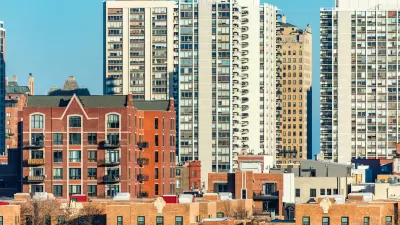In the wake of multiple building collapses in recent years, the bill seeks to identify dangerous building conditions before they escalate.

A new city law will mandate ‘proactive’ building inspections in New York City, reports Nish Amarnath in Smart Cities Dive. “Int. 0904, the Billingsley Terrace Structural Integrity bill, requires the New York City Department of Buildings to create a risk-based inspection program that can identify dangerous buildings using a model to predict the likelihood of structural failures by assessing factors such as building data, violation history and any prior facade inspection reports.”
The bill aims to prevent building collapses and dangerous conditions in older buildings by identifying risks. “Bill Int. 0904 seeks to address deficiencies in the DOB’s complaints-driven, reactive inspection process — an issue that has surfaced in the city’s aging building stock and recent incidents, including the Billingsley Terrace collapse in the Bronx and the parking garage collapse in lower Manhattan, the city council said in the release.”
If signed by the mayor, the bill would require the DOB to develop a predictive model for the inspection program that would take into account a variety of building data including “qualified exterior wall inspector certification history, prior maintenance records, the number of 311 complaints filed, permit history, the date of the most recent alteration,” as well as building age, size, materials, floors, and more. Owners of buildings found deficient would have to submit a corrective action plan to make the building safe.
FULL STORY: NYC Council approves legislation requiring proactive building inspections

Maui's Vacation Rental Debate Turns Ugly
Verbal attacks, misinformation campaigns and fistfights plague a high-stakes debate to convert thousands of vacation rentals into long-term housing.

Planetizen Federal Action Tracker
A weekly monitor of how Trump’s orders and actions are impacting planners and planning in America.

In Urban Planning, AI Prompting Could be the New Design Thinking
Creativity has long been key to great urban design. What if we see AI as our new creative partner?

Pedestrian Deaths Drop, Remain Twice as High as in 2009
Fatalities declined by 4 percent in 2024, but the U.S. is still nowhere close to ‘Vision Zero.’

King County Supportive Housing Program Offers Hope for Unhoused Residents
The county is taking a ‘Housing First’ approach that prioritizes getting people into housing, then offering wraparound supportive services.

Researchers Use AI to Get Clearer Picture of US Housing
Analysts are using artificial intelligence to supercharge their research by allowing them to comb through data faster. Though these AI tools can be error prone, they save time and housing researchers are optimistic about the future.
Urban Design for Planners 1: Software Tools
This six-course series explores essential urban design concepts using open source software and equips planners with the tools they need to participate fully in the urban design process.
Planning for Universal Design
Learn the tools for implementing Universal Design in planning regulations.
planning NEXT
Appalachian Highlands Housing Partners
Mpact (founded as Rail~Volution)
City of Camden Redevelopment Agency
City of Astoria
City of Portland
City of Laramie





























